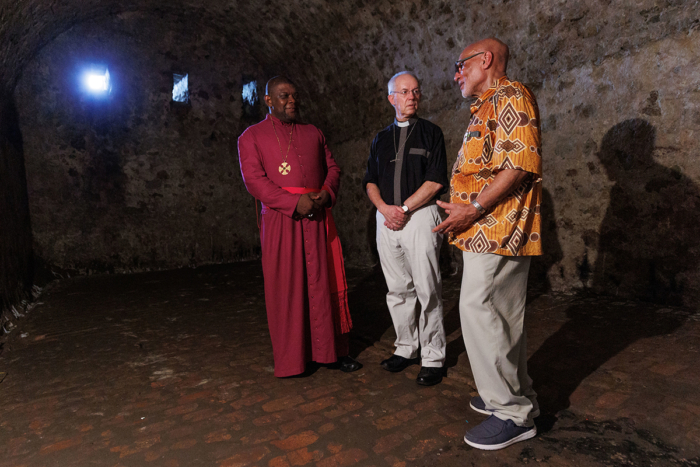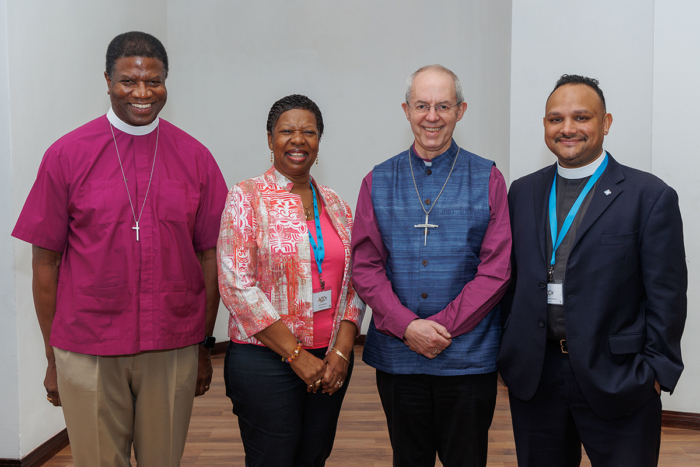Visit to castle’s dungeon in Ghana offers ACC lessons on church’s complicity in the transatlantic slave tradePosted Feb 15, 2023 |
|

From left, Archbishop Cyril Kobina Ben-Smith, primate of the Church of the Province of West Africa, Archbishop of Canterbury Justin Welby and Archbishop Howard Gregory of the West Indies share their their thoughts on visiting one of the cells at Cape Coast Castle in Ghana used to hold enslaved people before they were loaded onto ships to be taken to the Americas on Feb. 15. Photo: Neil Turner for ACO
[Episcopal News Service] Anglican Consultative Council members from 39 provinces, including The Episcopal Church, paused their week of business sessions in Ghana to spend Feb. 15 visiting Cape Coast Castle, a United Nations World Heritage site where centuries ago enslaved Africans were held before being loaded onto ships bound for colonies in North and South America and the Caribbean.
Leading the visit, Archbishop of Canterbury Justin Welby was joined by Archbishop Cyril Kobina Ben-Smith, who is hosting this ACC meeting as head of the Province of West Africa, and West Indies Archbishop Howard Gregory, who is a descendant of African slaves.
Deeply moving to visit the former British slave castle on Ghana's Cape Coast today, with my brothers the Primates of West Africa and the West Indies.
Transatlantic slavery was blasphemy; the Gospel calls us to repentance, and to striving for freedom and justice for all. pic.twitter.com/ZR1l2YZFQY
— Archbishop of Canterbury (@JustinWelby) February 15, 2023
Cape Coast Castle was built in the 1650s and passed through Swedish, Danish and Dutch possession until becoming a headquarters for British colonial administration in the 1660s. Africans were taken from their homes and held in dungeons at the castle, with squalid, overcrowded conditions and little ventilation. It was one of 50 castles on Africa’s west coast, 39 of them in Ghana, that served as points of embarkation for slave ships. An estimated 12 million to 25 million Africans passed through Ghana’s ports to be sold across the Atlantic as slaves.
The ACC members’ visit to the castle “was a reminder that the abomination of transatlantic chattel slavery was blasphemy: Those who imprisoned men and women in those dungeons saw them as less than human,” Welby said in written remarks released after the trip.
“It is to the Church of England’s eternal shame that it did not always follow Christ’s teaching to give life. It is a stain on the wider church that some Christians did not see their brothers and sisters as created in the image of God, but as objects to be exploited. Our response must begin on our knees in prayer and repentance. … But our response does not end there. We are called to transform unjust structures, to pursue peace and reconciliation, to live out the Beatitudes in big ways and small.”
Annette Buchanan, one of The Episcopal Church’s three ACC members, said in a phone interview with Episcopal News Service that her visit to the slave castle brought her “renewed grief and despair over the millions of lives that were lost during the transatlantic slave trade.”
Buchanan is a lay leader in the Diocese of New Jersey and a former president of the Union of Black Episcopalians. She had visited the Cape Coast Castle several years ago on a personal trip aimed at learning more about her African heritage. This visit, for her, “kind of reopened a wound.”
“I was again shamed and, honestly, appalled,” she said, “about the role of our Anglican Church with regard to the transatlantic slave trade, and especially galling was the fact that the Anglican Church built a church on top of the slave dungeon. While the enslaved people were beneath crying out in agony, starving, [Anglicans] were having a church service.”

The Episcopal Church’s delegation—Maryland Bishop Eugene Sutton, Annette Buchanan, a lay leader from the Diocese of New Jersey, and the Rev. Ranjit Mathews, the Diocese of Connecticut’s canon for mission, advocacy, racial justice and reconciliation—to the 18th Anglican Consultative Council poses with Archbishop of Canterbury Justin Welby on Feb. 14 in Accra, Ghana, where the Feb. 12-19 meeting is underway. Photo: Neil Turner for the Anglican Communion Office
Maryland Bishop Eugene Sutton, also as a descendant of slaves, recalled his own earlier visit to the Cape Coast Castle, when he was moved to tears by the relic of slavery’s horrors. During this second visit as a member of ACC, his reaction was different.
“This time there were tears,” he told ENS, “but my dominant feeling was anger, not really anger at white people. It was anger at the church.” Hundreds of years ago, the Anglicans who worshiped over the slave dungeon may have said to themselves they were following the Gospel of Jesus, “but I don’t recognize this gospel that I saw today” at the castle.
“So my anger was at the church, and how did we screw up the Gospel so much that it allowed persons to dehumanize, enslave and oppress others and think that was OK?”
The Rev. Ranjit Mathews, The Episcopal Church’s clergy member on the ACC, said he appreciated Welby’s sincere response to the visit. “The archbishop obviously was deeply moved and understood how the Church of England was complicit in that,” Mathews told ENS by phone.
But Mathews also lamented what appeared to him to be missed opportunities to deepen the discussion about this tragic history, which is shared by many of the Anglican Communion’s 42 provinces. Mathews, the Diocese of Connecticut’s canon for mission, advocacy, racial justice and reconciliation, previously served as The Episcopal Church’s Africa partnership officer from 2013 to 2017 and had visited Cape Cost Castle twice before in that role.
“I wonder about that connection that could have been made, to just see the picture in a broader, deeper and more theologically enhanced way,” he said. “It could have been a part of something even deeper formatively because of the significance of it. … It should be not just symbolic, but in essence we’re transformed by it.”
In Cape Coast Castle #ACC18 visited the grave of Philip Quaicoe (1741 – 17 October 1816). Taken as a child to England by @USPGglobal to be educated, he was the first African to be ordained in @churchofengland. The Royal African Company employed him as the chaplain at the Castle. pic.twitter.com/OsXC1pltDd
— Graham Usher (@bishopnorwich) February 15, 2023
Buchanan, Sutton and Mathews each said they were surprised that quite a few ACC members from other provinces were learning many of the details of the transatlantic slave trade for the first time. That contrasts with experiences in the United States, where the story of the slave trade is better known, looming over the country’s early history while underpinning the continued legacy of systemic racism in American society today.
After touring the castle, ACC members and other Anglican leaders attended a Service of Reflection and Reconciliation at the nearby Christ Church Cathedral, followed by a tree-planting event to support the new Anglican Communion Forest Initiative.
Very proud of Michelle Nyanyiba Green Anglicans rep for West Africa leading the tree planting with the Archbishop of Canterbury in Kamusi Diocese#acc18 pic.twitter.com/AuM5olwzeG
— Green Anglicans (@Greenanglicans) February 15, 2023
Welby also previously was joined in London recently by Ben-Smith and Gregory, his fellow archbishops, for the dedication of an exhibit at Lambeth Palace about the historic links between the Church of England and chattel slavery. On Feb. 14, the ACC members heard a presentation on that research project and the Church of England’s new £100million fund to “address some of the past wrongs” tied to its complicity in slavery.
The ACC is meeting Feb. 12-19 in Accra, Ghana’s capital, for prayer, worship and discussions on the operations, ministries and mission of the worldwide Anglican Communion, which is made up of autonomous, interdependent churches that all have historic roots in the Church of England. This is the 18th meeting of the ACC, which convenes about every three years. Each Anglican province may appoint and send up to three members to ACC, typically a bishop, another clergy member and a lay person.
ACC-18’s tour of Cape Coast Castle comes six years after Presiding Bishop Michael Curry led an Episcopal delegation to Ghana for a reconciliation pilgrimage organized by Episcopal Relief & Development. On that trip, Curry and other Episcopal leaders traveled from Accra to northern Ghana and visited the site of the Pikworo Slave Camp, which estimated 500,000 enslaved people passed through between 1704 and 1805.
The Episcopal pilgrims in 2017 also visited Elmina Castle. At sites like Elmina Castle and Cape Coast Castle, enslaved individuals were held in dungeons, standing and sleeping in their own excrement, before their captors loaded them onto ships bound for the Americas and Caribbean. The Church of England and The Episcopal Church both were complicit in the slave trade, with many Episcopalians owning slaves and profiting from the slave trade and its ancillary trade in goods and raw materials like rum, sugar, molasses, tobacco and cotton. The Portuguese, the Dutch and the British, all at one time or another, occupied the castles and controlled the transatlantic slave trade.
Britain abolished the slave trade in 1807 and in 1834 declared owning slaves illegal. U.S. President Thomas Jefferson in 1808 signed a law prohibiting the importation of slaves, but slave ownership continued until 1865 and the passage of the 13th Amendment.
– David Paulsen is an editor and reporter for Episcopal News Service. He can be reached at dpaulsen@episcopalchurch.org.

Social Menu